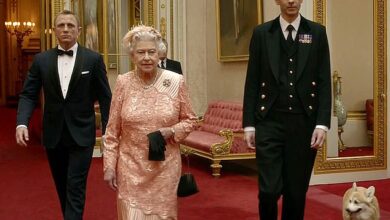Inside toxic feud tearing apart Sentebale: Why Harry clashed with charity chief and concerns over ‘colonial feel’ revealed – as poisonous rumours swirl around money: BARBARA DAVIES investigates
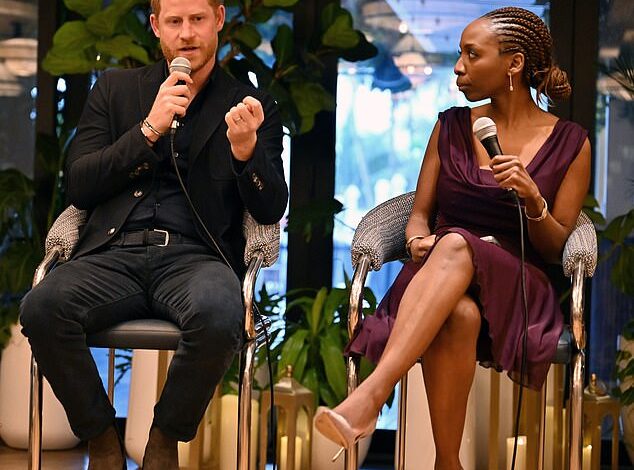
Amid the upper-crust glamour of Florida‘s Grand Champions Polo Club, there were signs of tension at a match held last April to raise funds for Prince Harry‘s Sentebale charity.
Who can forget the awkward podium shuffle which took place as the Duchess of Sussex presented her husband with the Royal Salute trophy, before instructing people where to stand for photographers?
Among those the duchess seemingly ‘rearranged’ for the cameras was none other than Dr Sophie Chandauka, Sentebale’s Chair of Trustees, who – as the events of the past few days have shown – is no less forthright than Meghan when it comes to speaking her mind.
Dr Chandauka, of course, is the formidable Zimbabwean lawyer at the centre of the ugly row which has engulfed the charity Harry co-founded in 2006 with Prince Seeiso of Lesotho in memory of their late mothers.
Prince Harry dramatically quit Sentebale this week ‘in solidarity’ with the charity’s disgruntled trustees who resigned when relations with their Chair ‘broke down beyond repair’ after she refused their request to step down.
They include his ‘second dad’ Mark ‘Marko’ Dyer, the flame-haired former Welsh Guards officer turned royal equerry who acted as mentor to William and Harry in the wake of Princess Diana‘s death.
Dr Chandauka, in turn, lashed out at those who ‘play the victim card and use the very press they disdain to harm people who have the courage to challenge their conduct’ and accused her detractors of ‘poor governance, weak executive management, abuse of power, bullying, harassment, misogyny’ and – last, but unforgettably, not least – ‘misogynoir’: a double whammy of sexism and racism.
More, in a moment, of the poisonous infighting which is ripping through the heart of a charity set up to help young people in Lesotho and Botswana living with HIV and Aids. For while Dr Chandauka has now reported her own board to the UK’s Charity Commission and launched legal action against them at the High Court in London, her critics, as we shall see, are refusing to go quietly.
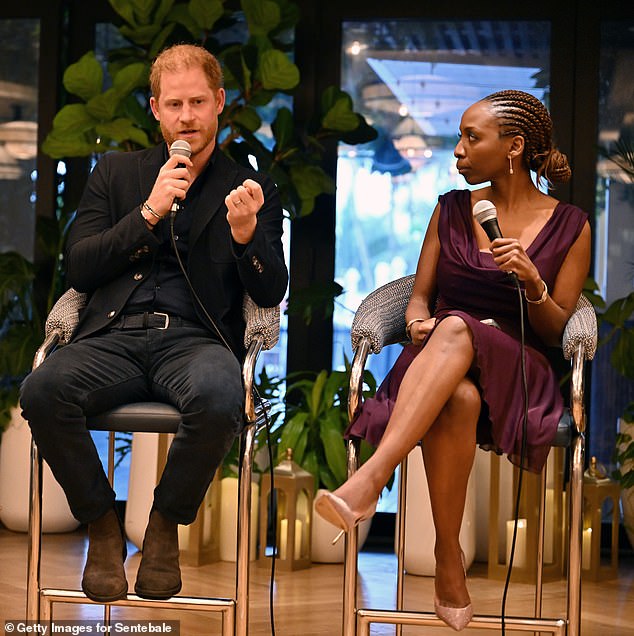
Prince Harry and Dr Chandauka during a panel discussion in 2024
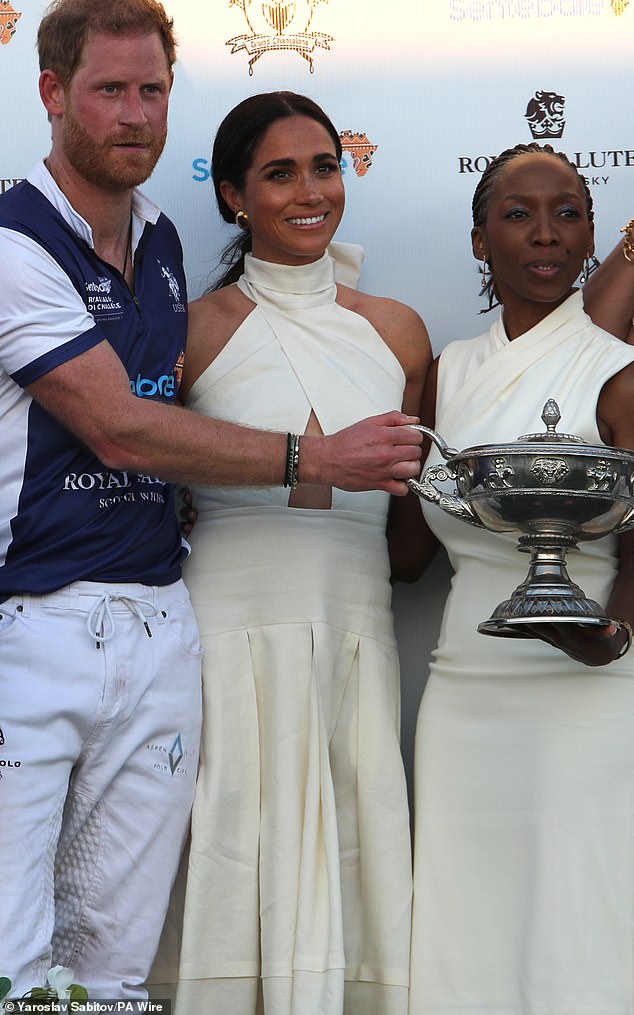
The Duke and Duchess of Sussex with Dr Chandauka last year
This week the Mail spoke to several key sources at the heart of the controversy and, amid claims and counter-claims from both sides, found no sign of this unseemly verbal spat abating.
Allegations that Dr Chandauka alienated one of the charity’s key sponsors, spent around £500,000 on external consultants and even demanded a salary for her voluntary role, were refuted and condemned by a spokesman for Sentebale this week who told me that ‘like much of the information being shared it is untrue and seriously defamatory in nature. This is concerning to Dr Chandauka and to Sentebale as a whole’.
Dr Chandauka’s family, the spokesman pointed out, was the third largest financial donor to the charity in 2024.
How on earth then – given that all those involved claim to be acting in Sentebale’s best interests – did this extraordinary state of affairs come to pass? And who is to blame for a rift which now threatens to tear Prince Harry’s beloved charity apart?
What is clear is that this almighty fracas is one which has been brewing ever since Dr Chandauka, whose grandmother was a housemaid in colonial Zimbabwe, took the reins at Sentebale in July 2023 after being on the board of trustees since 2008.
At the time, Prince Harry said her ‘experience, passion for social change and entrepreneurial spirit’ would be a ‘tremendous benefit to Sentebale’s next chapter’.
One of his friends told me this week that at first the 40-year-old royal liked and got on with the successful businesswoman and mother-of-four ‘but not for long’.
She ‘had her own way of doing things’, said the friend, ‘which given Harry had created a lot of it himself since the age of 18 wasn’t easy’.
The cause of this cooling in relations was said by a former trustee to be the inherent culture clash within the charity, not least because of the ‘colonial feel’ of the polo matches organised to raise funds. With wealthy players prepared to pay around £75,000 apiece to play alongside the Duke of Sussex, the annual Sentebale Polo Cup was the charity’s biggest annual fund-raiser, bringing in around £1.5 million every year.
The charity’s latest accounts for the year ending August 2023 showed a total income of £3,406,000.
According to the former trustee: ‘Dr Chandauka wanted to look at how things might be done differently. I understand the argument that there might be a more modern way to raise money, one that doesn’t involve a bunch of white rich people on horses, but at the end of the day, Sentebale is a small charity and Harry’s polo connections were what brought the money in, money which helped us do vital work with young people in Africa.’
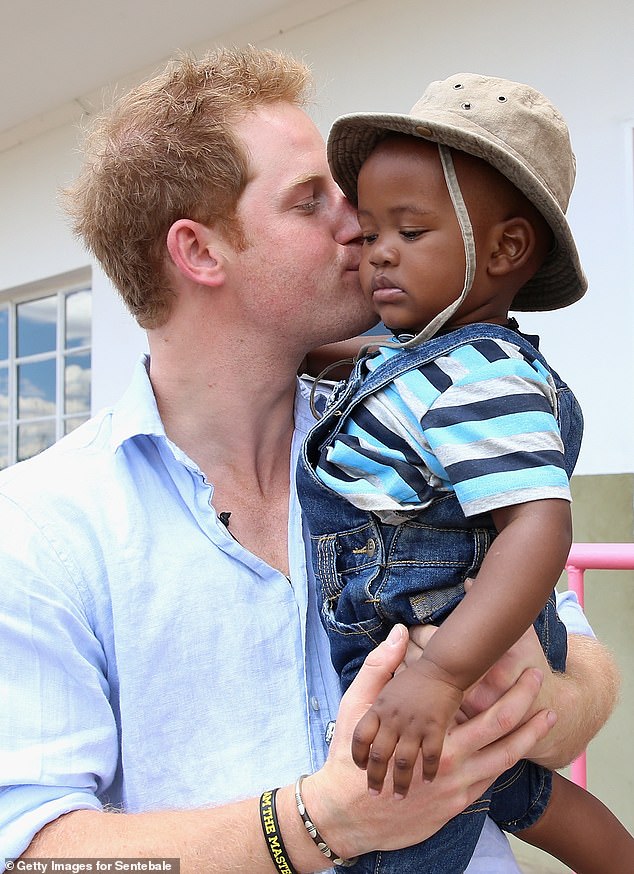
Prince Harry holds a young child during a visit to Bute-Bute, Lesotho, in 2014
Fundraising for Sentebale had already become challenging in wake of the Sussexes’ decision to quit the Royal Family and set up home in California.
Previous high-profile gala appearances at London events, such as the couple’s attendance at the West End musical Hamilton in August 2018 or Cirque du Soleil’s Totem show at the Royal Albert Hall in January 2019, had brought thousands into the charity’s coffers via proceeds donated from ticket sales.
In the US, however, the couple’s star power was somewhat eclipsed by the sea of celebrities and Hollywood stars around them.
According to the former trustee who spoke to the Mail: ‘Logistically it was harder to fundraise than in London and, if we’re honest, Harry’s popularity had waned somewhat because of everything that had happened.’
The decision to appoint Dr Chandauka in 2023, said the former trustee, was a ‘logical’ attempt to ‘move the charity’s centre of gravity from London to Africa and increase fundraising efforts across the US’ and move away from a model which largely saw trustees asking the wealthy to put their hands in their pockets.
In April last year, the duke appeared at the Ritz-Carlton Hotel in Miami alongside Dr Chandauka, at a dinner and panel discussion entitled ‘Potential is Waiting’ as the organisation explored new ‘partnering opportunities’.
This was followed, in October, by a high-profile visit by Harry to Lesotho and Johannesburg accompanied by Dr Chandauka as well as executives from potential donors including Google.
Several sources claimed this week that Sentebale spent hundreds of thousands of charity money on external consultants to maximise fundraising from donors but that ‘the anticipated funding tied to that investment did not come to fruition’. The former trustee said: ‘Normally, in these kind of situations, you make sure the cheque is signed by potential donors before they come on the trip.
‘You don’t offer some American bankers the chance to spend a couple of days driving around Lesotho with Harry, looking at the work the charity is doing, and then find out that you’re not going to get the gift.’
This claim was refuted by the Sentebale spokesman who said that the charity had engaged ‘expert consultants as necessary from time to time to help generate a very healthy pipeline of future opportunities from corporate and family office funding as a result of the Return to South Africa tour’ and that discussions about potential donations were ongoing.
Nevertheless, by December, the charity’s trustees were talking about removing Dr Chandauka from her post. And when, last month, the board tried to meet to vote for her removal, she filed a legal challenge at the High Court in London to prevent the meeting.
Although no documents are yet publicly available, a court source said this week that a claim has been filed in the name of Chandauka v Sentebale but that an order had been made to ‘stay’ the claim, likely because of the resignation of the charity’s trustees who, as well as Mr Dyer, include accountant Timothy Boucher, Botswanan management consultant Audrey Kgosidintsi, Dr Kelello Lerotholi, a cousin of Prince Seeiso, and businessman Damian West.
They described their decision this week as ‘nothing short of devastating’ but ‘in the best interest of the charity’ because it could not take on the ‘legal and financial burden’ of a legal fight.
Dr Chandauka said this week that she had ‘blown the whistle’ and reported the trustees to the UK Charity Commission which said it was ‘aware of concerns about the governance’ of Sentebale and is looking into them. One of the trustees, Dr Lerotholi, said this week that he did not recognise the claims being made by Dr Chandauka and that ‘in the meetings I was present in, there was never even a hint of such’.
After their joint resignation, Prince Harry and Prince Seeiso also said they would be sharing concerns with the Charity Commission ‘as to how this came about’.
Those concerns, the Mail was told this week, include a claim that Dr Chandauka ‘alienated’ one of Sentebale’s key sponsors, ISPS Handa – a Japanese non-profit sports promotion organisation which meant that the high-profile annual Sentebale Polo Cup did not take place last year and was replaced instead by the Royal Salute Polo Challenge in Miami.
The spokesman for Sentebale denied the claim and said that a representative of ISPS Handa ‘remained in touch with the organisation’, met with their director of fundraising ‘on many occasions’, attended the Miami polo challenge and offered to sponsor an event in both the US and Australia last year ‘that wasn’t possible because of Prince Harry not being available’.
This week it was claimed that Dr Chandauka had sought ‘a salary’ – according to one source rumoured to be an amount of around £300,000 – for her unpaid role, although the Mail has been unable to verify this claim. Untrue, according to Sentebale’s spokesman, who said such a figure was never discussed.
The spokesman said: ‘In fact, Prince Harry and Mark Dyer offered compensation to Dr Chandauka due to the extraordinary volume of work she was doing for the organisation, particularly in the first half of the year.
‘They asked Dr Chandauka to pull together a proposal to present to the board to compensate her. But in the end she preferred to continue without pay.’
The spokesman said there was ‘substantial board documentation and correspondence’ involving both Prince Harry and Mark Dyer to back this up.
What is clear is that Dr Chandauka is not a woman to be messed with. Born in Harare in February 1978, the daughter of two teachers, her father Joshua spent hours in his garage building children’s playground equipment to sell to nurseries so he could send his daughter and her two siblings to private school.
In 1994, she took part in a sponsored school exchange trip to Ontario in Canada. She later attended Lake Superior State University and, as part of her course, spent a year in the UK at Birmingham University.
She went on to study at the College of Law and the Oxford Institute of Legal Practice and qualified in 2005 as a corporate lawyer with Baker & McKenzie in London. In 2007 she was short-listed as a finalist for the British Legal Awards Young Solicitor of the Year and, in 2008, was selected as one of Management Today’s 35 Women Under 35. Her career has seen her work for some of the world’s biggest companies including Meta and the Virgin Group. She is also the founder of the Black British Business Awards.
In 2021 she was awarded an MBE by the Queen ‘for services to diversity in business’.
Her sister Dr Rumbi Chandauka is an NHS doctor based in Sheffield. Her Oxford University-educated brother, Dr Tinashe Chandauka, is a scientist with whom Sophie Chandauka founded the biotech company Nandi Life Sciences. In an interview with the New Statesman in 2023, she declared: ‘I know how to hustle and build.’
Speaking out this week she declared: ‘I am an African who has had the privilege of a world-class education and career. I will not be intimidated. I must stand for something. I stand for those other women who do not have the ways and means.’
She added that ‘beneath all the victim narrative and fiction that has been syndicated to the press is the story of a woman who dared to blow the whistle’.
Somewhere inside the contradictory accounts given this week lies the truth about the devastating events which have taken place inside the charity.
The tragedy, of course, is that this regrettable public spectacle detracts from the brilliant work the charity is doing with young people in southern Africa.
The charity’s spokesman denied claims this week that it was at risk of collapsing under the burden of the current crisis on top of Donald Trump’s decision to freeze and cut USAID which once benefited the charity.
‘The organisation, like many organisations in Africa who have been impacted by the withdrawal of international funders, has adopted a highly effective mitigation strategy, has embarked on a restructuring process, and is in very positive discussions with perspective funders.’
But Sentebale insiders say they cannot see the charity surviving without ‘heartbroken’ Prince Harry at the helm.
Due to celebrate its 20th anniversary next year, he was just 21 when he set it up, after spending part of his gap year in Lesotho in 2004 and coming face-to-face with Aids orphans and children living harsh existences caring for cattle in remote mountain areas.
The charity’s name means ‘forget-me-not’ in the Sesotho language and was personally chosen by Harry in tribute to his mother who loved the flower.
He declared at the time: ‘As far as I’m concerned, I’m committed for the rest of my life.’
The friend who spoke to the Mail said that ‘if circumstances were different’ he had no doubt Harry and others who resigned would return to Sentebale.
‘It’s hard to imagine how a charity set up by two princes in honour of their late mothers can go on without them,’ said the friend.
‘If the opportunity was there, I think he’d jump at the chance to get back in the saddle.’
Additional reporting: Sam Greenhill

